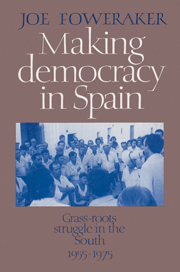Book contents
- Frontmatter
- Contents
- Preface
- Introduction: personal networks, political strategies and the making of democracy
- PART I PERSONAL NETWORKS, POLITICAL TRADITIONS AND STATE POLICIES
- 1 Unquiet hearts: the primitive world of the first political men
- 2 The burden of hopes and hatreds: ideological traditions in clandestine circumstance
- 3 Oligarchic unity and working-class divisions: a political economy of E1 Marco de Jerez
- 4 Political clans and capitalist planning: a political economy of Francoism
- PART II SYNDICAL PRACTICES, SOCIAL STRUGGLES AND POLITICAL PROTESTS
- PART III POLITICAL PRACTICES, REPRESSION AND STRATEGIC RESPONSES
- PART IV POLITICAL STRATEGIES AND THE DEMOCRATIC PROJECT
- Bibliography
- Index
2 - The burden of hopes and hatreds: ideological traditions in clandestine circumstance
Published online by Cambridge University Press: 29 September 2009
- Frontmatter
- Contents
- Preface
- Introduction: personal networks, political strategies and the making of democracy
- PART I PERSONAL NETWORKS, POLITICAL TRADITIONS AND STATE POLICIES
- 1 Unquiet hearts: the primitive world of the first political men
- 2 The burden of hopes and hatreds: ideological traditions in clandestine circumstance
- 3 Oligarchic unity and working-class divisions: a political economy of E1 Marco de Jerez
- 4 Political clans and capitalist planning: a political economy of Francoism
- PART II SYNDICAL PRACTICES, SOCIAL STRUGGLES AND POLITICAL PROTESTS
- PART III POLITICAL PRACTICES, REPRESSION AND STRATEGIC RESPONSES
- PART IV POLITICAL STRATEGIES AND THE DEMOCRATIC PROJECT
- Bibliography
- Index
Summary
What useless efforts! What sterile sacrifices!… The legacy of so much labour was going to be lost forever! The new generations disowned the old folks, and refused to receive from their tired and feeble limbs the burden of hopes and hatreds.
Blasco Ibañez, La BodegaThe 1930s in Spain was a time of open class warfare, and the most exploited and radical of the sectors in struggle was the rural working class, which accounted for three of the twenty-three million inhabitants of what was still a predominantly agrarian nation. In an epoch when the country appeared trapped in a cul-de-sac of economic and political backwardness, more than any other sector these ‘workers in sandals’ (Claudín: 1983b) raised the spectre of popular revolution; and it was they who provided the mass of popular support for the credo of Andalucían anarchism. So it is tempting to see the social struggle in El Marco de Jerez as a continuation of this ideological tradition into the very different economic and political context of the forced accumulation and State-led industrialization of the Franco years; and consequently to argue that, whatever its intrinsic interest, it is something of an anachronism in an historical moment which sees the creation of a new industrial working class and a new class of industrial capitalists (see Chapter 4).
- Type
- Chapter
- Information
- Making Democracy in SpainGrass-Roots Struggle in the South, 1955–1975, pp. 29 - 45Publisher: Cambridge University PressPrint publication year: 1989



